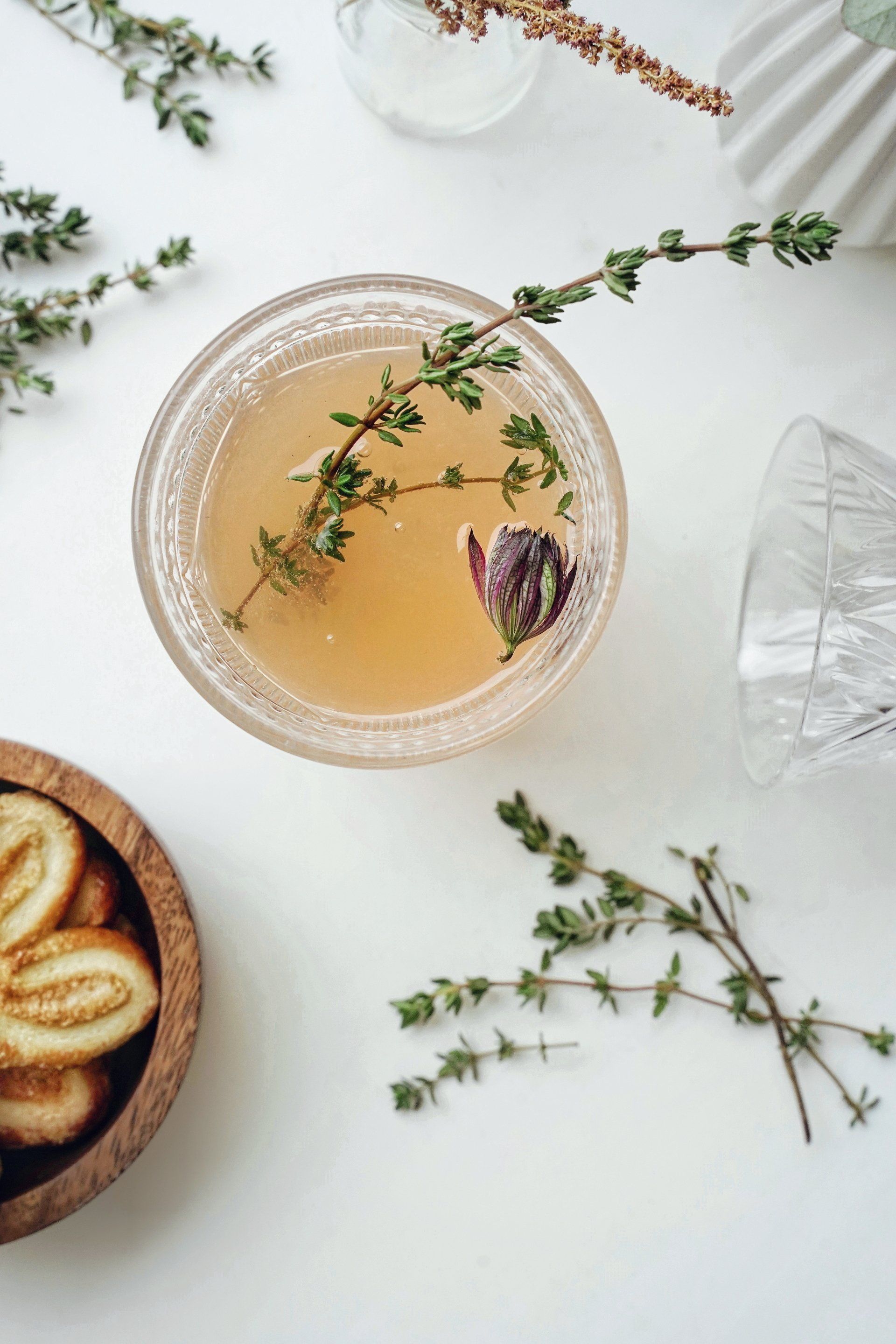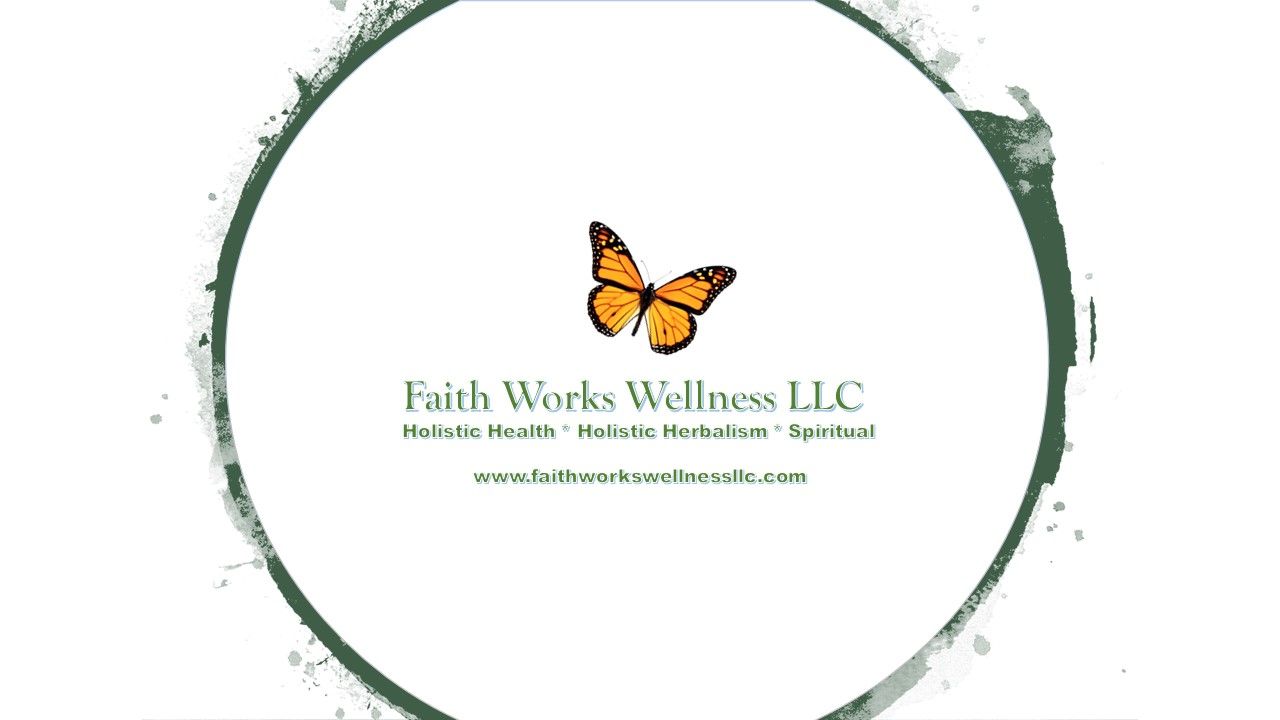Traditional Medicine and Holistic Herbalism aka Holistic Medicine
Some ask: "If you are a herbalist why did you use traditional medicine when you were sick?"

If you read my recent post under, "Angels on Earth", you may realize that I have been sick since somewhere around April 6th or so, I am still fighting this nasty lung infection. At first, I was evaluated for Covid: negative. Then when I went back a week later, I was told it is not worth testing as I may have Covid, but it would be too late to apply any specific Covid remedy into the mix. So, we just went with the symptoms which were furious and powerful, including a super nasty headache lasting about two weeks; a very painful cough, lots of chest congestion, chest pain, a sore throat, loss of voice and extreme fatigue. I had Covid a little over a year ago that put a spongy hole in my lung, aka pneumonia, which was extremely painful, and it took about a year to completely heal. My lungs are my downfall, no matter how well I eat, no matter how much I run and walk which unless I am sick, I do one or the other daily. No matter how well I take care of myself, my lungs become a target of infection in the right circumstance. People have asked, "Since I am a holistic herbalist, why did I elect traditional medicine?" and also, "If you're so healthy, why can't you beat this lung stuff?" These are legitimate questions. Here are my humble responses: Medicine is great for fixing acute illness or injury: a heart attack, a stroke, a broken bone, appendicitis. But medicine does not do much for chronic diseases; it usually only masks the symptoms or changes the cell messaging to block pain or change the way cells function in some manner, but the underlying problem remains. The problem is when symptoms are masked or when cell messages change, for example, especially when medications are used for prolonged periods of time, this can and usually does impact cells of similar make up elsewhere in the body. Now medicine can certainly bring comfort for some aches and pains, such as arthritis, but it is not fixing the problem and it may cause another problem in a different part of your body. An example of this might be aspirin use or other pain relievers. Aspirin type pain relievers change how the cells respond to a situation and this inner functional change can lead to some significant side effects. So, an aspirin for an occasional headache (or other pain reliever) will not really be an issue for most, but continued use becomes a problem in health. In my personal health strategy, I prefer not to take aspirin unless the pain is unbearable, which to me is far greater than just discomfort. I try to deal with the cause of the pain with natural and/or herbal solutions. I find this to work more holistically as it addresses the cause of most problems without side effects. For example, congestion can cause headaches, therefore if you clear congestion, the headache usually dissipates. I often breathe in thyme to reduce congestion by simply putting thyme in boiling water and breathing in the steam; it is amazing. This can be a good thing to do after exposure to many people as it has been reported to have a sort of cleaning effect on the lungs as well. However, there are still some precautions necessary, especially for people like me, with COPD or other respiratory issues. How and when to use herbs properly becomes essential information and continued education in this field is required to keep knowledge current. It is also important for those in traditional medicine to stay current on medical findings and medication data. Tension from pain and sickness can also create a pressure-cooker headache. Chamomile with ginger most often eases the tension, therefore the headache eases and the ginger quiets an upset stomach for many people quite effectively. Sometimes, meditation does the trick alone or it may be enhanced with herbs or other natural courses. If the headache is powerful, I may add a little Queen of the Meadow aka Lady of the Meadow to my chamomile and ginger which has a natural component in it called salicylic acid. Salicylic acid is a precursor of aspirin and can work similarly to relieve pain. However, as a precursor to aspirin this herb may also increase internal bleeding. But, whole plants or plant parts (minimally processed) are wrapped in natural fiber, and when prepared holistically and used properly, often result with less stomach issue or other side effect occurrence. Aspirin comes from this herb or similar herbs, but they are a stripped and mechanically changed version of the whole natural plant (which alleviates pain more gently and naturally). There are still some precautions using herbs, like Queen, such as: It should not be used by pregnant and lactating women, and it is contraindicated in people who do not support aspirin. This is why it helps to not just read herbal information on the internet but work with an herbalist who regularly works with plants and people's health and wellness goals and who continue herbal and health coaching education.
Let us look at cholesterol medicine for example. Cholesterol medicine lowers cholesterol and this is particularly important if you have high cholesterol because the risk of stroke and heart attack increases significantly as cholesterol (LDL or bad cholesterol) rises in your body. But is cholesterol medicine the answer? If so, it should never be the sole answer. People with high cholesterol may think they are doing all they can to lower cholesterol, but are they? Do they know all the options? Even if cholesterol medicine is absolutely required, the individual is always far better off by seriously addressing food intake, which is medicine when used to properly and specifically nourish for cause, and exercise. Cholesterol does not suddenly go to unhealthy levels for most people. It is a course in action that occurs over time, and it can often be detected early with physicals long before medicine is even necessary. This is when serious conversation between the doctor and the patient is very important. It is not a, "wait and let's see approach" while HDL climbs further up the ladder, it is a prime opportunity for change. Even if the doctor does not take this opportunity to discuss how the patient can address this, an individual working on his or her own can and should take the initiative to selfheal through avenues of healthy nutrition and lifestyle changes, if they know where to begin. Holistic Herbalist can significantly help an individual through education, awareness and support of nourishment enhancements and behavior modification, exercise strategies and lifestyle changes. Herbal information may be offered as additional support, as appropriate, to further support healthy outcomes. If you choose to add herbals to your daily regimen of cholesterol management, (or other health challenge) be sure to collaborate with your doctor and an herbalist. Your doctor may need to watch your cholesterol levels more closely, as dramatic changes may occur requiring medication to be lowered. Your herbalist may help you review your symptoms and health considerations before selecting herbs for consideration before trying. Before herbs are added, diets are modified, or exercise is added, you should check with your doctor. In addition, start first with diet and exercise before adding herbs, as these alone may reduce cholesterol significantly and added herbs may not even be necessary. It is important to note that herbs may be added in several ways and this example is limited and not all inclusive. Herbs can be added that simply support nourishment with no specific target of cholesterol, providing overall nutritional benefit which may, as an outcome of this process, aid in the long-term cholesterol goals plus increase health outcomes overall. Herbs can be added that focus on lowering cholesterol levels solely; or herbs can be added to support overall health and target cholesterol levels as part of a cholesterol management program. Whether or not medication has been started, the best place to start is through diet and exercise considerations and then consider whether herbals may push your positive results a bit further, if needed. I believe the best place to be is natural as much as possible. Taking medications for extended periods of time can create havoc in your body in so many ways. This is a personal choice however and certainly not for everyone. Holistic herbalism cannot address many acute problems as effectively as medicine, but often they still can be used if the need for remedy is not immediate. Medicine is appropriate for this short-term use. If you have a lung infection, "yes" there are herbal strategies available to try, but they take a little time to get sufficiently in the body and work. and if it does not work for you; important time has been lost. With lungs as responsive to illness as mine, this would be a bad option. My best option is to take my medicine, get over the infection and start building my overall strength back with herbs. My body has no forgiveness in time and space where lung illness is concerned, and it must be addressed quickly. My best defense, is a good offense, doing all I can to stay healthy; wearing a mask around others during specific seasons of fall and spring (which I have not done); and proactively taking herbs for lung enhancement. Now this is something I lack doing as well and I will be adding this to my regimen. I have not done that yet simply because when I am not in the worst seasons for me (fall and spring), I have little issues and I do not even think about it until boom, I have a lung issue. So, I will be establishing an immensely powerful herbal program for myself that will work to keep my lungs functioning as best they can, which is significant because I tested over one hundred on a pulmonary function test which is outstanding lung capacity. In comparison, my husband does not have my lung issues, and unfortunately, we saw the symptoms creeping up on him of my illness. I was immediately able to jump into herbal action for him. I prepared him tea every day with echinacea, Tulsi, peppermint, spearmint, lemon, and honey. Sometimes I added nettle and oat straw for added nourishment. My husband never became seriously ill. The illness was still in him, you could hear it in his voice and cough, but he never lost a day of work. He was also able to function well at work, perhaps not to his usual speed and personal expectation, but the Tulsi helped him to function well and keep him altogether when ill. With proper rest at night, nutritious food, and herbs, he recovered without cough medicine, antibiotics, or steroids. HIs speed of recovery is already at least half of mine on medication, but I do have the added lung issues. Even still, this gives me pause to reflect how my prevention regimen may also cut recovery time should a future infection occur. I know my husband is generally reactive following exposure to my illnesses, and in the past few years he has become quite ill. The last two illnesses, however, I started him on herbs and the results were like day and night, they remained mild in comparison to his past experiences. Therefore, I will also create a fall and spring regimen for him that works for his needs, prevention and foundational strengthening. People do not realize the power of herbs in food and in teas, tinctures, decoctions, etc., they are amazingly powerful. Herbal remedies have been used over five thousand years and over 50 percent of the United States population uses herbal remedies in some fashion daily. Herbal medicine can help with chronic issues by bringing about a better functioning body right down to the powerful and most important cellular level. Most problems today stem from chronic issues, herbal and holistic health practices can make a very positive impact in health issues stemming from chronic issues. Many, if not most, deaths occur from long term chronic issues, reducing the chronic load on our bodies is detrimental to healthier long-term life experience and improved quality of life.
Before closing, I want to share that several years back, I was chronically ill with bronchitis, pneumonia and lung infections, even chronic asthma all in one period of time lasting about 12 weeks, I was on thirty-two medications including antibiotics, pain relievers, asthma inhalers, steroids, steroid shots and nasal steroids, pearls for coughing, and liquid for congestion. During and long after using all the medicines, I was lethargic, heavy, weak, breathless, depressed, light-headed, and unable to physically do anything like I used to do. In fact, I had such bad arthritis and bursitis, I could barely walk. My knee hurt, my hip hurt, my right leg and butt cheek had sciatic pain running up and down it and I could not sleep with all the pain. I could not sit properly, I could not stand long, I could not even walk up the stairs without holding the railing. The picture of my future, per my ortho at that time, included shots in my knee, my feet and potential surgery in time for my knee and hip. Absolutely not for me! Since I have followed my holistic health path, I reclaimed all my health. I run a 5K normally four times a week, I walk at least two miles every day in between. I go to the gym. I have no active arthritis pain, my hip does not hurt ever, my sciatica is gone, my foot pain is gone, and my knee pain is nonexistent, unless I injure it somehow. My holistic health practices returned me, to the best I can be, to my former healthier self before illness and medication, maybe even better; stronger. I can keep up with my grown-up kids when they visit, and my husband and I enjoy the fullness of life. Nothing slows me down, but my lung issue. Now back to the lung issue. You might think, well you are always sick in fall and winter with lung issues. Yes, I am, there is no getting around that but last time I had Covid it was my health that brought me through. It was my physical strength and capacity that worked along with the medicine to help me get well, along with my herbs. Many people with pre-existing diseases like COPD do not survive Covid, they do not survive asthma attacks and/or they never return to a functioning life. I have, and I have done so with the Grace of God, good medicine, healthy lifestyle, including nutritious food and holistic herbalism. Herbalism not only adds valuable vitamins, minerals and yes, even proteins to your daily intake, they can be created to help restore what is out of balance or not functioning as well as it should. Herbal solutions are generally effectively and safe for most people. Many people are concerned about using fresh or dried herbal teas or tinctures that they fear are unsafe or too expensive. A trained herbalist can partner with you to sort through the herbal questions and concerns by a thorough review of your family history, medicines, family traditions, cultures, and lifestyle practices. You are in charge of you, not the herbalist, nor the doctor and you should always be prepared with questions of your own when you visit either and to research what you are told. Take a long look at your medicines and note the side effects. How many are you taking in one day? Who is watching the contraindications of all these medications overall? How are they affecting other parts of your body? Can you do without any of these medicines? If so, what would you need to do to create healthy change and make it sustainable? We often believe "someone is handling all this", but truth be told, most often, all this is overlooked, and many things are missed.
There is a place for medicine and there is a place for herbalism, the best option includes the best resources from both worlds. To do this effectively, you need a doctor and an herbalist who listen to your goals for health and well-being, and they should collaborate with you to help you create a path to get there. It is true that many herbalists custom craft herbal options at a price, but this would only be a fraction of the cost of the medicine your actions may prevent you needing. Or you could learn to custom craft yourself. Your doctor also benefits financially in most, if not all instances, from prescribing medication; the price is usually high, and you cannot craft the medicine yourself. In addition, you are most likely dependent on insurance approval. No one can be sure if medications will always be available when your body becomes dependent on them, as had happened with prescription shortages during Covid. Prevention, if possible, is always best. You can always ask your doctor, are there other natural options available that are more holistic, there are many ways you can be treated naturally in most circumstances. Also, functional medicine is really a great blend of traditional and herbal medicine, I believe this is an area of medicine that will continue to expand in wonderful ways. If your doctor does not know the answer, ask a certified health coach or an educated and trained herbalist as they may have knowledge of several different practices locally available. A good doctor will offer diverse options, including a blend of both with close supervision; like trying a holistic avenue of weight loss and herbal use for example with a thirty day follow up. Keep in mind that doctors have little training in nourishment in the scheme of their education and most know little about herbs, so they may refrain from questions they don't know how to answer. This doesn't mean your question isn't valid or that there isn't a better solution. It means if they dance around your question, if they do not answer your questions specifically, then perhaps, you might be happier working with a doctor who is more open, or perhaps more knowledgeable, about holistic health--there are more and more doctors now truly interested in holistic health. A holistic herbalist like me, can draft a plan for a client to bring to his or her doctor for consideration that addresses food plans, exercise, meditation or other stress reducing activities and quite possibly, herbals. Many physicians will offer the response, "Good, let's try it for thirty days and see how you are doing at that time and go from there". This makes perfect sense.
If you are interested in learning how holistic herbalism can help you in your health and wellness goals, please use the contact link on the website to set up a call on my calendar to address your questions and concerns or email me at candace@faithworkswellnessllc.com.
Resources for many specific topics discussed above are found below, you may find one or more helpful.
Blessings for great health and wellness,
Candy Flanagan
aspirin blocks the pain how - Search (bing.com)
side effects of aspirin - Search (bing.com)
Meadowsweet Uses, Benefits & Side Effects - Drugs.com Herbal Database
is aspirin made from herbs like queen of the meadow - Search (bing.com)
Best Herbs for Steam Inhalation: Thyme, Mint, Eucalyptus, and More
Consider the options - Mayo Clinic
Is Your Doctor Getting Drug Kickbacks? | Healthy Home Economist
The content on our website, Facebook websites; brochures, etc., is for educational purposes only. Although we try to carefully provide useful and accurate information, you are responsible to research and verify information before relying on it. We are trained herbalists and not licensed or registered healthcare practitioners. We cannot diagnose health conditions, nor prescribe medicines legally; we are not medical doctors. However, we will recommend or suggest medicinal herbs for various health complaints, as we believe in the safety and efficacy of botanical medicine.
The information we provide is not intended to be a substitute for medical treatment. Please consult your medical care provider before using herbal medicine, particularly if you have a known medical condition or if you are pregnant or nursing. You are responsible for your own health. As with conventional medicine, herbal medicine is vast and complex, and must be used responsibly. People react differently to different remedies. Some herbs are contraindicated with certain pharmaceutical drugs.
Further, some helpful herbs may be confused with harmful and/or deadly substances.



